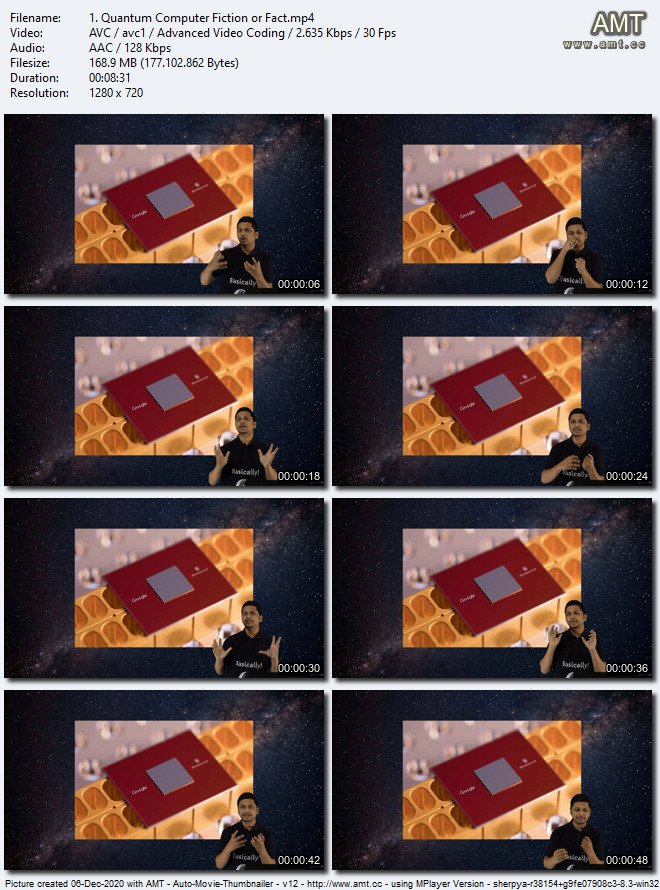 MP4 | Video: h264, 1280×720 | Audio: AAC, 44.1 KHz, 2 Ch
MP4 | Video: h264, 1280×720 | Audio: AAC, 44.1 KHz, 2 Ch
Genre: eLearning | Language: English | Duration: 30 lectures (4h 24m) | Size: 3.68 GB
Understand the Fundamentals of a Quantum Computer and the DWave framework. Solve tasks on a real Quantum Computer
What you’ll learn:
Use a real Quantum Computer to solve real world problems
Basics of Quantum Computing
Basics of Quantum Physics
Basics of Cirq programming
Basics of Dwave-Ocean-SDK
Quantum implementation of Logic gates
Basic Combinatorial Optimisation techniques
Requirements
No initial Mathematics knowledge is required.
No initial knowledge of Quantum Physics is required. Will be covered in the course
Description
This course teaches the fundamentals of Quantum Computing including the basics of Quantum Physics and Quantum Simulations. This course is divided into 4 modules
Quantum Computing Basics: This section deals with the introduction to the wonderful world of Quantum Computing. The comparison between a Classical Computer and a Quantum Computer are explained.
Quantum Physics Section: This section deals with the introduction to the astronomically tiny world of the physics phenomenon that support quantum computers. Concepts like SuperPosition, Quantum Entanglement, Quantum Tunnelling are covered in this section. Quantum Physics has a strong connection with mathematics. In this section, the quantum phenomenon are explained by avoiding a lot of the mathematical jargon aiming towards providing a good grasp over the fundamental concept.
Cirq: This section deals with using Google’s Cirq framework in Python to design Quantum Circuits. A simulator called Quirk is also used which uses Silicon Hardware to emulate a Quantum Processor
Dwave Leap: This sections covers the Signing-Up for the Dwave-Leap service which enables anyone to start using a real Quantum Computer to solve real world problems. This Quantum Annealer will also be used to solve a Graph-Optimization problem.
Combinatorial Optimisation: This section deals with a fundamental concept in the domain of combinatorial optimisation called as Quadratic Unconstrained Binary Optimisation (QUBO). QUBO is used to further formulate and solve problems like simulating the NOT gate on a Quantum Computer
Hope you have fun exploring the depths of Quantum Computing.
Happy Coding,
Vinay Phadnis ?
Who this course is for
Programmers curious about using Quantum Computing for Machine Learning
Aspiring Quantum Programmers
Programmers curious to take part in the Quantum Computing revolution

Password/解压密码0daydown
Download rapidgator
https://rg.to/file/212a0188af3f15bd27369616a8545e27/Quantum_Computing_Theory_to_Simulation_and_Programming.part1.rar.html
https://rg.to/file/06de373d1022421e9de42630e6e0beb4/Quantum_Computing_Theory_to_Simulation_and_Programming.part2.rar.html
https://rg.to/file/aa36e88c15d7df62b163b6fe249fdf93/Quantum_Computing_Theory_to_Simulation_and_Programming.part3.rar.html
https://rg.to/file/e82a83d8bde8fc32a32f555b51ec3217/Quantum_Computing_Theory_to_Simulation_and_Programming.part4.rar.html
Download nitroflare
https://nitroflare.com/view/B87A9D7699E99D0/Quantum_Computing_Theory_to_Simulation_and_Programming.part1.rar
https://nitroflare.com/view/15D08DCBCD3B513/Quantum_Computing_Theory_to_Simulation_and_Programming.part2.rar
https://nitroflare.com/view/EF493792B6AA8FB/Quantum_Computing_Theory_to_Simulation_and_Programming.part3.rar
https://nitroflare.com/view/8FD122F9EF8B712/Quantum_Computing_Theory_to_Simulation_and_Programming.part4.rar
转载请注明:0daytown » Quantum Computing: Theory to Simulation and Programming